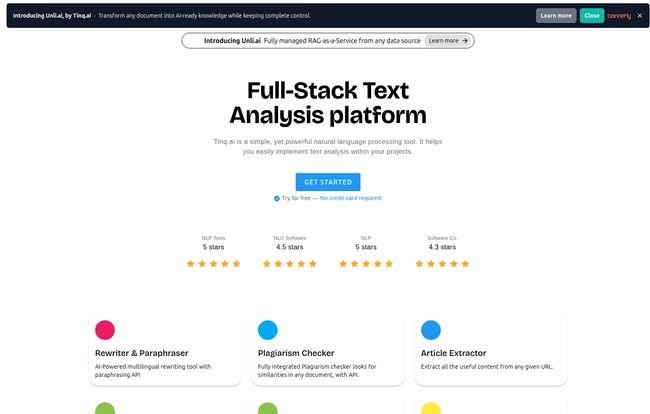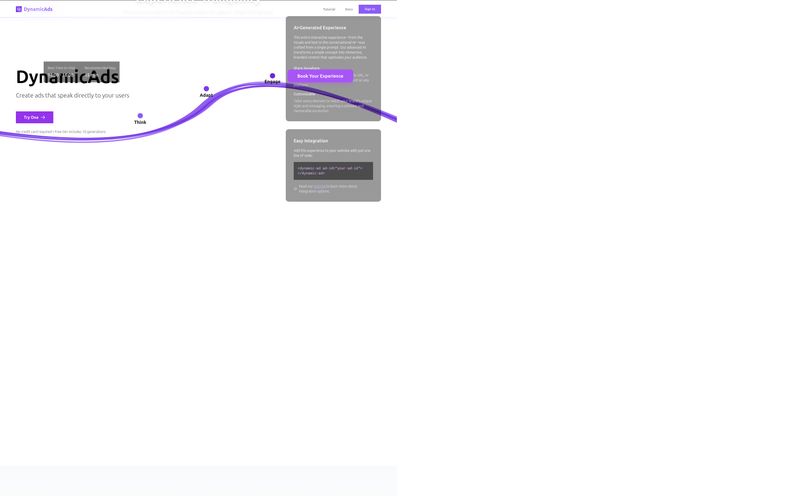Something like analyzing customer reviews. It usually involved wrestling with some obscure Python library, a mountain of dependencies, and a server that would mysteriously crash at 3 AM. It was a nightmare. So, when a platform like Tinq.ai strolls onto the scene, promising a "Full-Stack Text Analysis Platform" that you can plug in with a simple API call, the seasoned pro in me is immediately skeptical. But the pragmatist in me, the one who just wants to get things done, is leaning in close.
For years, we've seen this unbundling of complex tech into easy-to-use APIs. Stripe did it for payments, Twilio did it for communications. The question is, can Tinq.ai really do it for Natural Language Processing (NLP)? Let's find out.
What Exactly Is Tinq.ai Anyway?
Let’s clear something up first. Tinq.ai isn't one single tool. It's not like a standalone grammar checker or a summarizer app. Think of it more like a professional-grade toolbox. Inside, you have a whole collection of specialized, powerful NLP tools, each accessible via its own API. You don't have to lug the whole heavy toolbox around; you just grab the specific wrench or screwdriver you need for the job.
The platform is built for developers, sure, but its real magic lies in its accessibility. It's designed to let you add some serious AI intelligence to your projects without needing a Ph.D. in computational linguistics. You get a single API key, and suddenly you have access to a whole suite of text analysis capabilities. It's a pretty compelling offer, especially for small teams or solo builders who need to move fast.

Visit Tinq.ai
The Core Features That Actually Matter
A long list of features is great for a marketing page, but what actually works and what is it good for? I've been in the SEO and digital marketing game for a long time, so I tend to look at these things through a very practical lens.
For the Content Creators and SEOs
This is where I got pretty excited. The Rewriter & Paraphraser is the first thing many will look at. And no, it’s not just a basic article spinner from 2008 that spits out gibberish. In my tests, it’s surprisingly coherent, making it useful for rephrasing social media updates or generating alternative headline ideas. The Summarizer is another gem. Got a 5,000-word competitor article you need to understand quickly? Feed it to the API. It's a massive timesaver for research. Then there's the Article Extractor, which cleanly pulls the useful content from a messy URL, stripping out ads and navigation. Very handy.
For the Developers and Data Nerds
Okay, this is the platform's bread and butter. The Sentiment Analysis is a classic and essential tool. You can feed it a customer review—like their example,
The food was excellent but the front was incredible
—and it can tell you the overall feeling is positive. This is huge for things like brand monitoring or automatically sorting customer feedback. Digging deeper, the Named-Entity Recognition (NER) is incredibly powerful. It can pull out people, places, and organizations from a block of text, turning unstructured data into structured, usable information. And for those who need more control, you can even build Custom Classifiers and chain different tools together into Workflows. That’s where things get really interesting from a product-building perspective.
Let's Talk Pricing. Is It Fair?
Ah, the money question. This is often where a beautiful dream of a tool turns into an expensive reality. But with Tinq.ai, I was pleasantly surprised. The pricing feels… reasonable. Almost too reasonable.
They have a straightforward subscription model that caters to different levels of usage. The entry point is incredibly accessible, which is a smart move.
| Plan | Price | Key Features |
|---|---|---|
| Starter | $9 / month | 1,000 requests/mo, access to all NLP tools. |
| Pro | $25 / month | 10,000 requests/mo, Plagiarism Checker (100 credits/mo), Live chat support. |
| Ultra | $499 / month | 750,000 requests/mo, Plagiarism Checker (1,000 credits/mo), Video call support. |
But here's the part I personally love: the one-time credits. I absolutely detest being locked into a monthly plan for a tool I might only need for a single, intensive project. Tinq.ai lets you buy a bucket of credits that are valid for 12 months. This is a fantastic, user-friendly model that more SaaS companies should adopt. It shows they understand that not everyone has a consistent, predictable workload.
Now, the catch. The Plagiarism Checker. It’s not fully included in the base request count; it operates on a separate credit system. For the $9 plan, you have to buy credits for it separately. This is probably due to the computational expense of plagiarism checking, but its something to be aware of if that's your primary use case.
The Good, The Bad, and The API Key
So, after kicking the tires, what's the verdict? No tool is perfect, but Tinq.ai gets a lot right. The biggest advantage is having this wide array of genuinely useful NLP tools under one roof with a single, simple pricing structure. The ability to go from an idea to a working prototype with text analysis features in an afternoon, rather than a month, cannot be overstated.
On the flip side, the main drawback is the one inherent to any SaaS platform: you're building on someone else's turf. If Tinq.ai has an outage, any feature in your app that relies on it also has an outage. That’s the trade-off for convenience. And as mentioned, the separate credit system for the plagiarism checker feels a bit like a hidden surcharge if you're not paying attention. It's not a deal-breaker, but you need to factor it into your costs.
Who Is This Really For?
I see a few clear winners here.
First, indie developers and startups. If you want to add powerful features like sentiment analysis or text summarization to your app without the massive overhead, Tinq.ai is a no-brainer. Second, marketing and SEO agencies. The ability to quickly analyze SERPs, rephrase content for different channels, and monitor brand sentiment is a huge workflow enhancement. Finally, academic researchers and students could get a lot of mileage out of this for processing text data without getting bogged down in coding.
Who might want to look elsewhere? A massive enterprise with extremely high, specific demands might be better off building a proprietary solution in-house. And, of course, if your budget is zero, a paid tool is a non-starter, though the $9 plan is pretty darn close to free.
Frequently Asked Questions About Tinq.ai
- Is Tinq.ai easy for non-developers to use?
- The platform itself is built around an API, which is a developer tool. However, with the rise of no-code platforms like Zapier or Make.com, a tech-savvy marketer could certainly integrate Tinq.ai's features into their workflows without writing code.
- What's the difference between monthly plans and one-time credits?
- Monthly plans are for consistent, ongoing usage and offer a better per-request value. One-time credits are perfect for a single, large project or for sporadic use, as they don't lock you into a recurring subscription and are valid for a full year.
- How does the plagiarism checker work with credits?
- The plagiarism checker consumes special credits. Higher-tier monthly plans include a set number of these credits. If you're on the Starter plan or need more, you have to purchase these credits separately.
- Can I trust the output for professional use?
- In my experience, the output is very solid. Like any AI tool, it's best viewed as a powerful assistant. You should always have a human review the output for critical applications, but for tasks like data analysis, content ideation, and initial drafts, it's incredibly reliable.
- Does Tinq.ai support multiple languages?
- Yes, the platform includes a language detection tool, and many of its core NLP functions are designed to work with various languages, though you should always check the documentation for specifics on a particular tool or language.
My Final Verdict
Tinq.ai is a powerful, well-designed, and intelligently priced platform. It successfully bridges the gap between raw, complex NLP technology and the developers and creators who need practical solutions. It’s not magic, and it won't write your whole application for you, but it provides the essential, high-quality building blocks to do some truly amazing things with text.
For me, it represents a shift I've been seeing for years: the democratization of powerful technology. You no longer need to be a giant corporation to have world-class text analysis. You just need a good idea and an API key. And that's a pretty exciting place to be.



